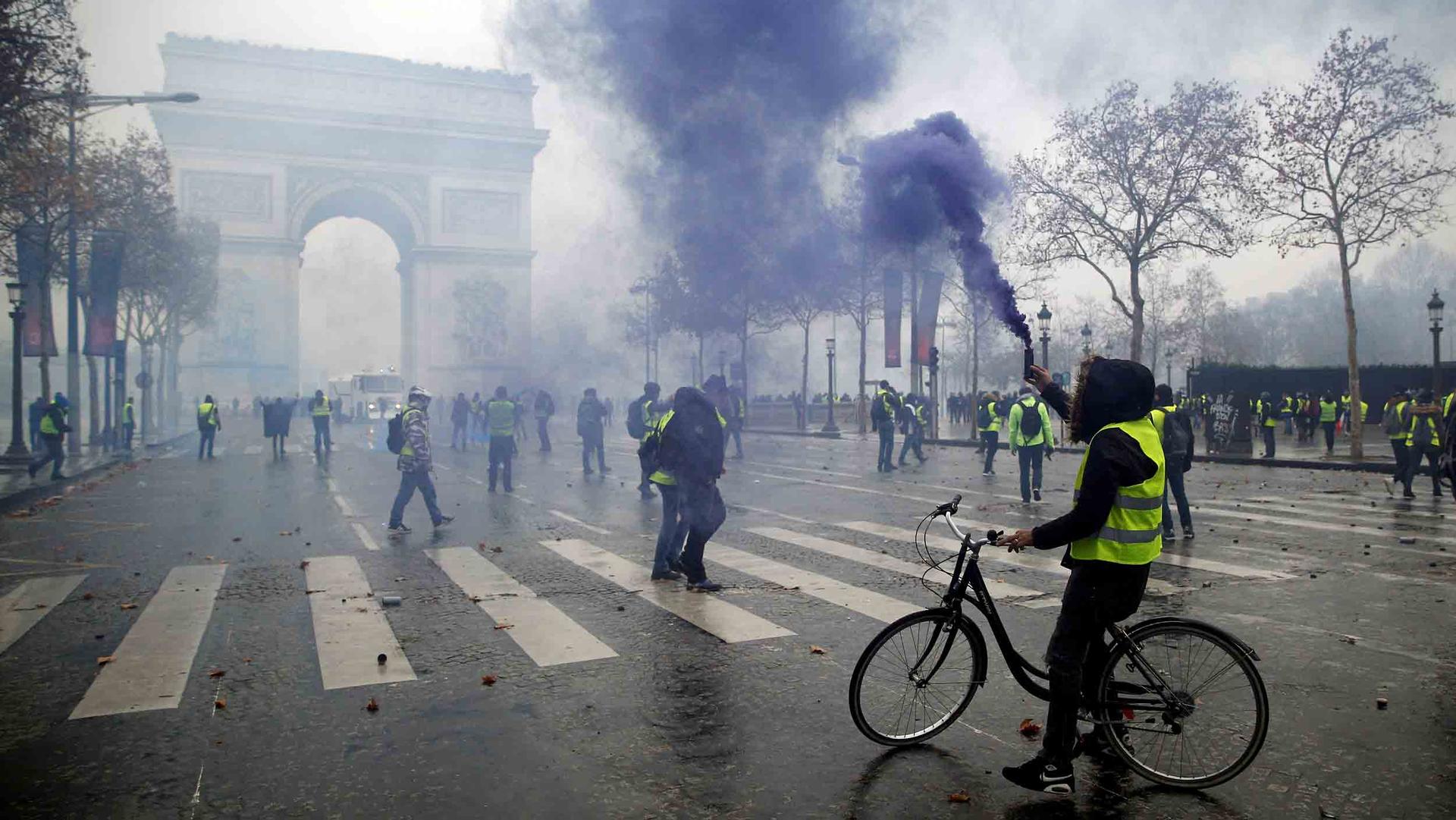For France’s yellow vest protesters, ‘gas tax is the tip of the iceberg’
Protesters wearing yellow vests, a symbol of a French drivers’ protest against higher diesel taxes, face off with French riot police during clashes at the Place de l’Etoile near the Arc de Triomphe in Paris, France, on Dec. 1, 2018. The protest has expanded to include students angry with changes to the university system as well.
If France’s proposed gas tax had gone through, Romaric Giacomino would have been faced with more than 400 euros in additional gas taxes each month. That’s part of what spurred the Marseille schoolteacher to organize the “yellow vest” protests that rocked France this weekend.
Demonstrators vandalized the Arc de Triomphe in Paris and looted stores along the Champs-Élysées. Hundreds were injured and arrested. Three died.
But the “gilet jaunes” are about more than just the gas tax, which France’s prime minister suspended for six months on Tuesday in response to the protests.
“We’re not a political group,” Giacomino said. “The complaint by the yellow jackets isn’t the gas tax. It’s that there are too many taxes. The gas tax is the tip of the iceberg. The president explained the gas tax, saying we have to stop consuming diesel. The French were hoping that instead of raising diesel prices on top of gas prices, we would see the price of petrol lower below the price of diesel. And unfortunately, this imposed tax prevents people from working.”
Rim-Sarah Alouane, who studies law at the University of Toulouse, said that students were joining the protest not because of the gas tax but in reaction to changes to France’s university admissions process over the past summer.
“The protests are getting bigger and unfortunately, today, a high school was put on fire,” Alouane said. “So it’s not stopping. People just can’t live in France anymore. People just can’t make it anymore. So the rise of the price of gas was just the cherry on top of the cake.”
Alouane said people were not happy despite winning a pause on the implementation of the gas taxes.
“They still don’t believe the government,” she said. “We need more. Again, it’s not just about this tax. It’s about the cost of [living] and the disparity between the wealthy and the poor and about how taxes are not really well distributed. So, what people are asking is literally what is in our motto — equality — and how do you manage to implement equality by having a just and fair tax system.”
Related: France’s Macron makes U-turn on fuel-tax increases in face of ‘yellow vest’ protests
As one of the organizers behind the yellow vests in southeast France, Giacomino says that most of the protesters there weren’t behind any destruction.
“We were peaceful in this protest,” he said. “However, radical groups, like Black Block — anarchists — came and broke everything.”
Yellow jackets in France symbolize motorists. All French drivers have to have one in the trunk to put on during breakdowns.
The movement began in France’s more rural areas as roadblocks on roundabouts. Giacomino was among them.
Related: France’s Macron hunts for way out of ‘yellow vest’ crisis
“Every four out of seven days, I’m out on the roundabout talking to drivers who pass by,” he said. “Many of them weren’t happy with us the first day.”
But that changed.
“They’d bring coffee and food to us at the roundabout, and say, ‘We support you, we can’t join you because we have to work, but we support you, so we’ll give you something,’” he said.
As a part-time math teacher in Marseilles, Giacomino travels more than an hour by car to get to work. That’s why the taxes will hit him so hard.
“The state tells me one day that my salary won’t change, and then the next, it says that I have to pay 400 euros more in gas taxes at the end of each month,” he said. “Is that sustainable? Well, when you don’t have a choice, you adapt and you work. But when it’s 80 percent of French people who have to sustain themselves and work harder to survive … luckily, there’s this protest.”
The story you just read is accessible and free to all because thousands of listeners and readers contribute to our nonprofit newsroom. We go deep to bring you the human-centered international reporting that you know you can trust. To do this work and to do it well, we rely on the support of our listeners. If you appreciated our coverage this year, if there was a story that made you pause or a song that moved you, would you consider making a gift to sustain our work through 2024 and beyond?
